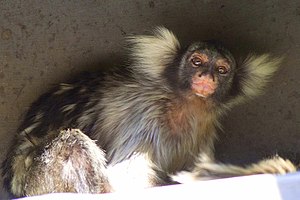Sagui-de-santarém – Wikipédia, a enciclopédia livre
| Sagui-de-santarém[1][2] | |||||||||||||||||||||||
|---|---|---|---|---|---|---|---|---|---|---|---|---|---|---|---|---|---|---|---|---|---|---|---|
| Estado de conservação | |||||||||||||||||||||||
Dados deficientes (IUCN 3.1) [3] | |||||||||||||||||||||||
| Classificação científica | |||||||||||||||||||||||
| |||||||||||||||||||||||
| Nome binomial | |||||||||||||||||||||||
| Mico humeralifera É. Geoffroy, 1812) | |||||||||||||||||||||||
| Distribuição geográfica | |||||||||||||||||||||||
 | |||||||||||||||||||||||
| Sinónimos | |||||||||||||||||||||||
| |||||||||||||||||||||||
O sagui-de-santarém (Mico humeralifer) é uma espécie de primata do Novo Mundo endêmico da Amazônia brasileira que habita as florestas entre os rios Tapajós e o Madeira.[4]
Referências
- ↑ Groves, C.P. (2005). Wilson, D. E.; Reeder, D. M, eds. Mammal Species of the World 3.ª ed. Baltimore: Johns Hopkins University Press. 118 páginas. ISBN 978-0-8018-8221-0. OCLC 62265494
- ↑ Rylands AB and Mittermeier RA (2009). «The Diversity of the New World Primates (Platyrrhini)». In: Garber PA, Estrada A, Bicca-Marques JC, Heymann EW, Strier KB. South American Primates: Comparative Perspectives in the Study of Bahavior, Ecology, and Conservation. [S.l.]: Springer. pp. 23–54. ISBN 978-0-387-78704-6
- ↑ Rylands, A. B. & Silva Jr., J. S. (2008). Mico humeralifer (em inglês). IUCN 2012. Lista Vermelha de Espécies Ameaçadas da IUCN. 2012. Página visitada em 05 de outubro de 2012..
- ↑ Rylands, A.B.; Coimbra-Filho, A.F.; Mittermeier, R. A. (1993). «Systematics, geographic distribution, and some notes on the conservation status of the Callitrichidae». In: Rylands, A.B. Marmosets and tamarins: systematics, behavior and ecology (PDF) 3ª ed. Oxford (UK): Oxford University Press. pp. 11–77. 0-19-85022-1


 French
French Deutsch
Deutsch